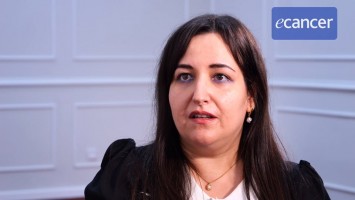Actually, my co-author, because I couldn’t be there so my co-author, Professor [??] he helped us to present the study. Our study is a review article so we want to really make a statement from our translational working group from SIOG. We want to show the importance and significance of the advantage concerning liquid biopsy applications for older adults with cancer.
In this review article actually we tried to assess the effectiveness and also concerning about the update of the liquid biopsy because of such a very updated non-invasive method which was able to analyse, for example, circulating tumour DNA, circulating tumour cells, extracellular vesicles, microRNAs, for example from the blood or non-blood fluids from the patient which would be helpful in early detection, for example, and treatment monitoring and also able to assess the treatment response, particularly for our geriatric patients with cancer.
So we hope that this review can really give updated information concerning liquid biopsy applications in this cohort and also to call more attention concerning the focus on the translational research in this part.
What was the methodology of the study?
Basically this is a systematic review so we want to really summarise and conclude for the recent studies and clinical trials which are using the liquid biopsy technologies for cancer patients, in particular including the geriatric cancer patients. So we evaluated the potential of the liquid biopsy for improving the diagnosis, accuracy, clinical decision-making and also individualised treatment strategy for those older adults and we also considered the age-related factors, for example, which might affect this biomarker analysis.
Importantly, we also highlight the need for patient involvement in the design of future studies on liquid biopsy. So to make sure that our older adults, their perspectives and also their preferences are also incorporated into the clinical research to make it more patient orientated studies.
What are the results of this study?
For our results, because it’s a review article so we visualised. So in our article we are able to visualise the guideline, for example, for the future applications about liquid biopsy in older adults for cancer care. In this study we also highlighted the consideration, for example, with the liquid biopsy integrated, for example, with the Comprehensive Geriatric Assessment for the older adults with cancer. We also summarised our study to show them for different tables including all the important liquid biopsy-based studies for the patients, young patients and also older patients, including different methodologies of liquid biopsy, concerning cell-free DNA and CTC, for example, and also other liquid-biopsy-based analyses.
The involvement of the older adults was also highlighted in our [result pad] and in the table we also showed the key outcomes and, for example, the sensitivity and the specificity of the method concerning liquid biopsy.
So basically we really want to highlight the importance of liquid biopsy applications because we really believe that it will be a very promising tool for older adults and particularly to minimise the need for invasive tissue biopsies, for example. Also to make the dynamic monitoring for the patient care. Of course, we also highlight the challenge of the age-related mutations such as the clonal haematopoiesis for the intermediate potential [??]. So that may really affect the interpretation of the circulating tumour DNA analysis. So with this we really want to say in the future we want to have more accurate methods for the cell-free DNA analysis, for example. And also to combine other non-blood samples, for example saliva or urine samples, to take these solutions also to help the patient care as well.
Importantly, we also discuss the integration of liquid biopsy into the Comprehensive Geriatric Assessment which tries to assess not only the medical conditions but also the functional, psychological and social aspects of the health of our patients. So we want to use this review article to really draw attention concerning about using the liquid biopsy would really benefit a lot for our patients. Also to help them to understand the benefit and also the limitations, of course, of the liquid biopsy which could also help improve the informed decision making for the future.
Is there anything else you would like to add?
Concerning about additional information, I would say of course nowadays we know that they are really involved of liquid biopsy studies or trials ongoing. But there are really not so many studies focussed or emphasised concerning about application in the geriatric patients with cancer. So therefore for our study we really want to make this systematic review and also to make the statement. We tried to share with the scientific community concerning about updates of this liquid biopsy research and also to try to improve the public awareness, and particularly our patient cohort, to understand what was liquid biopsy and what kind of categories and what was the advantage and disadvantage concerning our liquid biopsy, for example for their care. And to try to bring more power and more investment concerning liquid biopsy as a translational research for our cancer care.
Patient Engagement in Translational Research
With our research article, with our systematic review work, we really want to emphasise the importance of patient education concerning about using the liquid biopsy and also actively involve them in the research plan and the decisions, not only to enhance the success of this technology but also to empower them for their cancer care journey.








